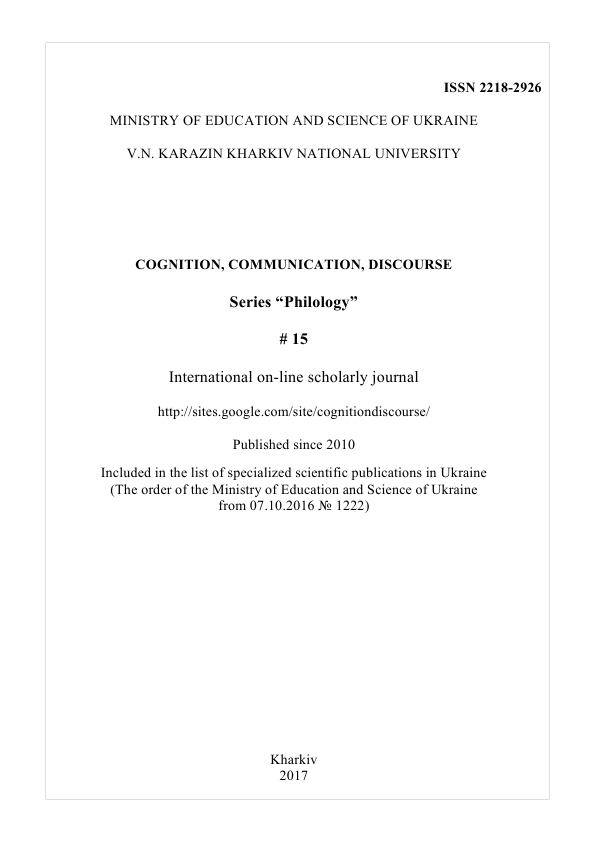Концептуалізація ЩАСТЯ у сприйнятті молодих носіїв казахської мови
Анотація
Cтаття аналізує концепт ЩАСТЯ в сприйнятті молодих носіїв казахської мови. Об'єктом дослідження є визначення щастя, дані учасниками експерименту в написаних ними творах на тему «Що таке щастя?» Аналіз показав, що основними критеріями ЩАСТЯ є сім'я і близькі їм люди. Аналіз також показав, що концептуалізація ЩАСТЯ учасниками експерименту грунтується на використанні метафор, метонімії та інших схожих поняттях. В результаті були виявлені прототипи когнітивних моделей концепту ЩАСТЯ, такі як «ЩАСТЯ – ЦЕ РАДІСТЬ» і «ЩАСТЯ – ЦЕ РАДУВАТИ ІНШИХ ЛЮДЕЙ».
Завантаження
Посилання
Francis, W.S. (2005). Bilingual semantic and conceptual representation. In: J.F. Kroll & A.M.B. De Groot (Eds.). Handbook of Bilingualism: Psycholinguistic Approaches (pp. 251–267). New York, NY: Oxford University Press.
Gruber, J., Mauss, I.B., & Tamir, M. (2011). A dark side of happiness? How, when, and why happiness is not always good. Perspectives on Psychological Science, 6(3), 222–233.
Hofstede, G. (1984). Culture’s consequences: International differences in work-related values. Beverly Hills: SAGE Publications.
Kajdar, A. (2009). Kazaktar ana tili aleminde (etnolingvistikalyk sözdik [The Kazakhs in the world of their mother tongue (ethnolinguistical dictionary)] (Vol.1). Almaty: Dyke-Press.
Kecskes, I. (2007). Synergic concepts in the bilingual mind. In: I. Kecskes & L. Albertazzi (Eds.). Cognitive Aspects of Bilingualism (pp. 29–61). Dordrecht, the Netherlands: Springer.
Kövecses, Z. (1991). Happiness: A definitional effort. Metaphor and Symbolic Activity, 6(1), 29–46.
Kövecses, Z. (2008). The conceptual structure of happiness and pain. In: Ch. Lascaratou, A. Despotopoulou, & E. Ifantidou (Eds.). Reconstructing Pain and Joy: Linguistic, Literary, and Cultural Perspectives (pp. 17–34). Newcastle, UK: Cambridge Scholars Publishing.
Libben, G. (2008). Words, mind, and brain. In: P. van Sterkenburg (Ed.). Unity and Diversity of Languages (pp. 111–121). Amsterdam/ Philadelphia: John Benjamins Publishing House Company.
Lyubomirsky, S., King, L., & Diener, E. (2005). The benefits of frequent positive affect: Does happiness lead to success? Psychological Bulletin, 131(6), 803–855.
McMahon, D.M. (2006). Happiness: A history. New York, NY: Atlantic Monthly Press.
Oishi, Sh., Graham, J., Kesebir, S., & Galinha, I.C. (2013). Concepts of happiness across time and cultures. Personality and Social Psychology Bulletin, XX(X), 1–19. DOI: 10.1177/0146167213480042.
Pimenova, M.V. (2012). Yazykovaya kartina mira [Linguistic Worldview]. Moscow: Flinta/Nauka Publ.
Schnelle, H. (2010). Language in the Brain. Cambridge: Cambridge University Press.
Vorkachev, S.G. (2001). Koncept schast’ya: ponyatijnyj i obraznyj komponenty [The concept of happiness: notion and image components]. Izvestiya RAN. Seriya Literatury i Yazyka. – RAS News. Literature and Language Series, 60(6), 47–58.
Vorkachev, S. (2004). Schast’e kak lingvokulturnyj koncept [Happiness as a linguistic-cultural concept]. Moscow: Gnozis Publ.
Uchuda, Yu., & Ogihara, Yu. (2012). Personal and interpersonal construal of happiness: A cultural psychological perspective. International Journal of Wellbeing, 2(4), 354–369.
Zurif, E.B., & Blumstein, Sh.E. (1978). Language and the Brain. In: M. Halle, J. Bresnan, & G. Miller (Eds.). Linguistic Theory and Psychological Reality (pp. 229–245). Cambridge, et al.: The MIT Press.
Автори, які публікуються у цьому журналі, погоджуються з наступними умовами:
Автори залишають за собою право на авторство своєї роботи та передають журналу право першої публікації цієї роботи на умовах ліцензії Creative Commons Attribution License (CC BY), яка дозволяє іншим особам вільно розповсюджувати опубліковану роботу з обов'язковим посиланням на авторів оригінальної роботи та першу публікацію роботи у цьому журналі.
Автори мають право укладати самостійні додаткові угоди щодо неексклюзивного розповсюдження роботи у тому вигляді, в якому вона була опублікована цим журналом (наприклад, розміщувати роботу в електронному сховищі установи або публікувати у складі монографії), за умови збереження посилання на першу публікацію роботи у цьому журналі.
Політика журналу дозволяє і заохочує розміщення авторами в мережі Інтернет (наприклад, у сховищах установ або на особистих веб-сайтах) рукопису роботи, як до подання цього рукопису до редакції, так і під час його редакційного опрацювання, оскільки це сприяє виникненню продуктивної наукової дискусії та позитивно позначається на оперативності та динаміці цитування опублікованої роботи (див. The Effect of Open Access).




